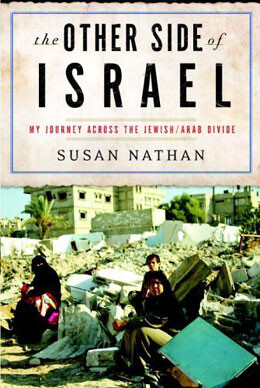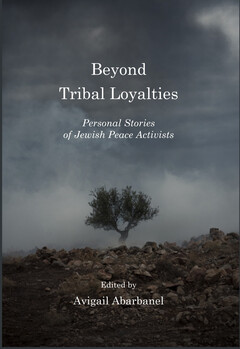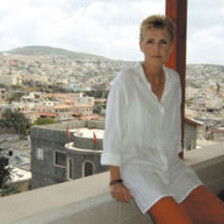The Electronic Intifada 17 November 2005

Nathan decides to move from her comfortable apartment in Tel-Aviv to the Arab town Tamra in the Galilee. Her unique and unusual move draws a great deal of criticism and condemnation from both her English and Israeli friends (most of whom consider themselves ‘leftist’). Ultimately, this decision costs her these relationships.
In Tamra, Nathan finds herself in an entirely different reality. She witnesses how Palestinians who are technically citizens of Israel are treated as less than second-class citizens, living in a police state of the worst kind, not allowed to enjoy the democracy and lifestyle of their Jewish peers. Indeed, the right to live wherever one chooses was one reserved for Jews, and denied to Nathan’s new Arab neighbors.
Nathan catches on to the other methods that Israel uses to try to make the lives of its Palestinian citizens so unbearable that they choose to leave. The Shin Bet (Israel’s internal security service) employs ‘legal’ and not-so-legal state means to keep all ‘Israeli Arabs’ under constant surveillance and basically control every aspect of their lives. Additionally, the Israeli state uses its bureaucracy to prevent Arab towns from expanding to accommodate their growing population and does everything in its power to make sure that Israeli Arabs live in conditions the rest of Israeli society would not tolerate.
The Arab citizens of Israel lack even the most basic services and conditions such as housing, health, education and infrastructure that are taken for granted by Israeli Jews. Proper cinemas, restaurants, community centres, class rooms and textbooks, even proper street names or numbers, is unheard of in many towns. The lives of the Palestinian citizens of Israel are filled with a justified fear, as a result of the humiliation, deep discrimination, hopelessness, and hardship they encounter daily.
Nathan finds that Israel also has designs on Palestinian identity — educators cannot teach Palestinian history at school, only allowed to teach the content approved of by the state, usually seen only through Zionist perspective. Teachers who dare to mention anything about the Naqba (the expulsion of over 750,000 Palestinians from their land during the establishment of the State of Israel) lose their jobs and can find themselves in danger. Moreover, any appointment of a teacher in an Arab school has to be approved of by the Shin Bet.
But what Nathan ultimately finds is that, without doubt, there are two states in Israel, one for Jews and one for Arabs. The state the Arabs live in is far from democratic, more akin to a vicious police state. And Nathan observes that Israeli Jews are either unaware of this or if they are, they believe that this is a state of affairs justified by ‘security concerns’.
Nathan’s experiences bolster Dr. Uri Davis’s argument that anti-Palestinian/anti-Arab racism in Israel is not only an attitude among the people but a deeply entrenched and explicit state policy. Moreover, this state-sanctioned racism is deliberately being concealed behind layers of bureaucracy and clever legislation that effectively make it invisible to the outside world.
This racism is so pervasive that those who speak out against racism towards Arabs, as Nathan finds out, are branded a risk, a potential enemy. Nathan is now being treated like a traitor in Israel. Nathan is now viewed by Israeli authorities with suspicion and when she travels in and out of the country she is treated similarly as many of her Palestinian friends - as though she was a potential threat to state security.
Nathan’s sober stories prove beyond doubt that Israel is no more a democracy than the former Apartheid South Africa was — a democracy for one select section of the population and an abusive and oppressive police state for the other.
Related links
Avigail Abarbanel is a former Jewish citizen of Israel. She is a psychotherapist/counsellor in private practice in Canberra Australia. She is an activist for Palestinian rights, a supporter of a one-state solution and the Canberra (Australia) Director of the international human rights organisation, Deir Yassin Remembered





